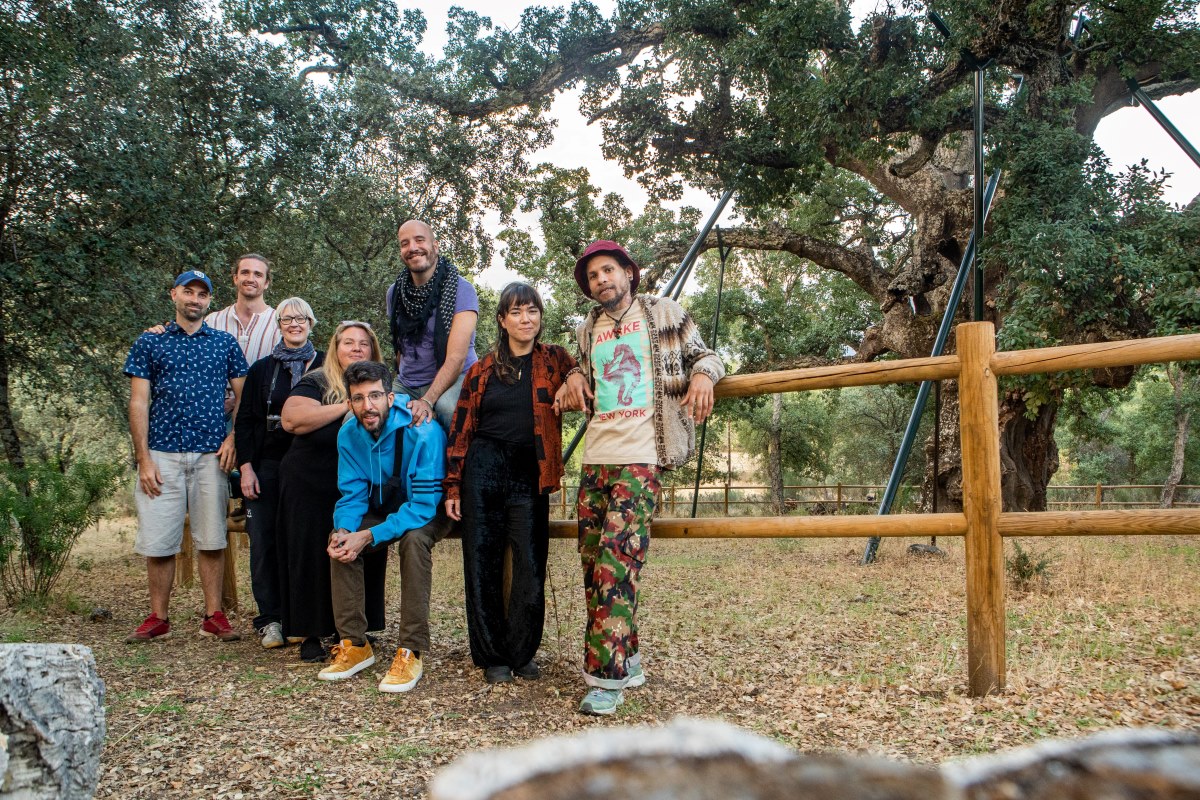“People are aware that they cannot continue in the same old way but are immobilized because they cannot imagine an alternative. . . . We need a vision that recognizes that we are at one of the great turning points in human history when the survival of our planet and the restoration of our humanity require a great sea change in our ecological, economic, political, and spiritual values.”
— Grace Lee Boggs
Article by Mai Ishikawa Sutton. Film by Julio Albarrán.
We arrived in Hervás, a Spanish town nestled in a valley a three hours drive outside of Madrid. A sharp turn off the main road, we slowly drove down a gravel road weaving between small orchards full of grapes, peaches, and apples, careful to avoid hitting the rabbits that leapt across ahead of us. Five minutes later, we came to a property scattered with little bungalows, sitting between olive trees and lush green. There was a field full of sheep; tiny lambs baaing and darting between the legs of their unamused parents lazily chewing on grass.
It was mid-September, and the eight of us traveled to this idyllic place to spend a week dreaming and conspiring. Those bucolic days in Hervás were shrouded in an awareness about the dire state of the world. Looking back, it seems like a dream, a suspended reality of peace and calm while elsewhere people continue to endure living nightmares. The world grows hotter, as land and oceans choke with plastic and poison and people are forced to migrate as their homes become uninhabitable. Fascism makes a comeback worldwide, as militarized police utilize new tactics and technologies to clamp down on dissent. Genocides and vicious civil wars are liberally sanctioned and paid for by powerful nations and industries. The power of capitalism is alive and well, and its power seeps into network technology. Deliberate programs of misinformation and surveillance have amplified greed and alienation.
And yet, amidst it all, we have to be able to imagine and construct alternatives. The DisCO framework creates a space for us to dream and manifest them into reality. We recognize that it’s necessary not only to stop the bleeding, but to bring about liberatory systems – those that do not justify violence or oppression for the sake of maintaining their own hegemonic existence, but are instead inherently designed to center individual agency and community autonomy.
L-R: Lucas Tello, Luis H. Porras, Mai Ishikawa Sutton, Cindy Kohtala, brandon king, Ann Marie Utratel, Stacco Troncoso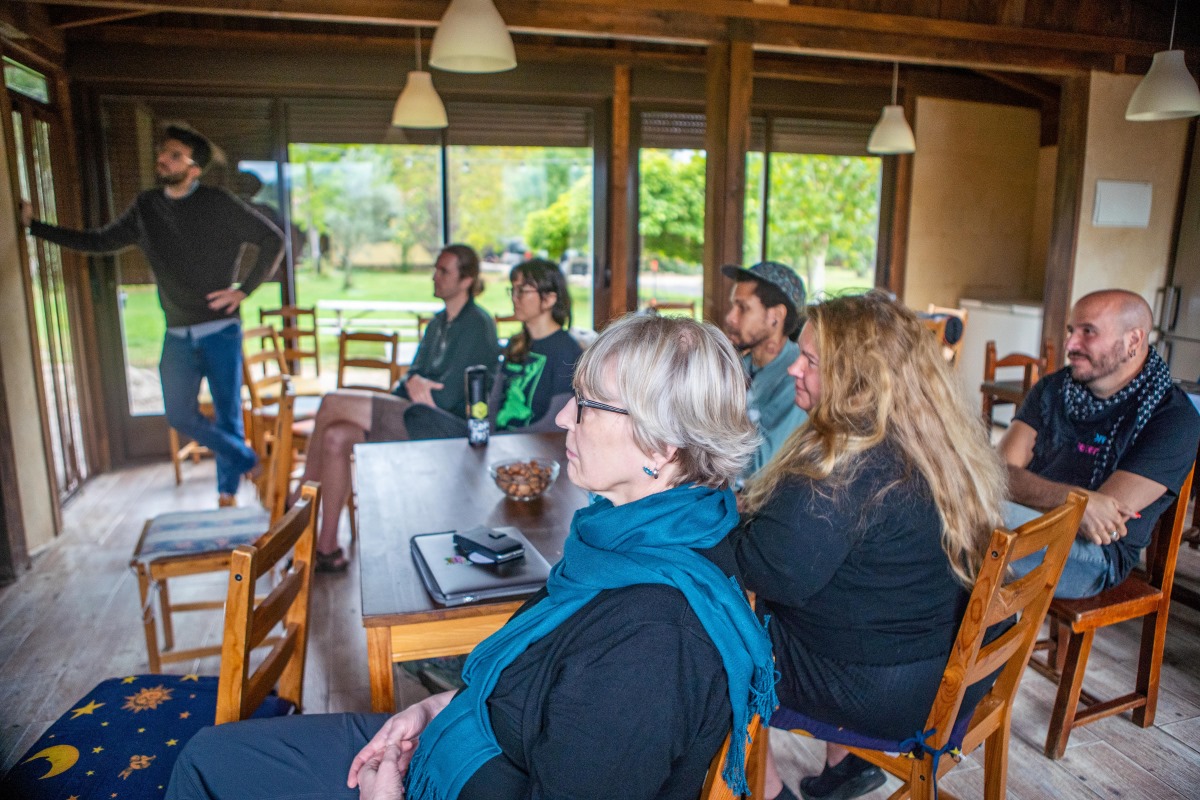
DisCO is a living, evolving framework that lets us choose how we want to spend our energy and creativity together to reignite the power of the commons. It begins with a goal: to restore our relationships to each other and the Earth.
This can start with a process of examining how we see and use our mental, spiritual and physical spaces, and build radically different notions of value that restore equity and power to groups who want to create lasting change in these powerful, terrifying and magical 2020s.
— From DisCO Basics: What is DisCO?
People have a fundamental desire and inclination to care for each other in the face of catastrophe. So what does it look like for organizations — the building blocks of societies — to prioritize care and liberation for all? We can look to the solidarity economy for answers, as it enshrines people’s right to actively participate in decision making and have their rights represented in economic activities and political state bodies.
DisCOs, or distributed co-operative organizations, are an anticapitalist, decolonial and intersectional feminist approach to this, a framework rooted in the commons of the digitally networked realm. In order to create a digital commons that actively works to upend hegemonic systems, co-operatives need to lean on each other and collaborate to build alternatives. For co-operatives to cooperate (which is one of the seven co-operative principles) and work in solidarity, it requires them to recognize where oppression hits people hardest. It requires them to actively address the ways in which capitalism, colonialism, racism, misogyny, homophobia, ableism, and elitism can overlap to amplify each other’s ability to dehumanize. DisCOs recognize this explicitly, and carry out this work from a place of love, care, and healing.
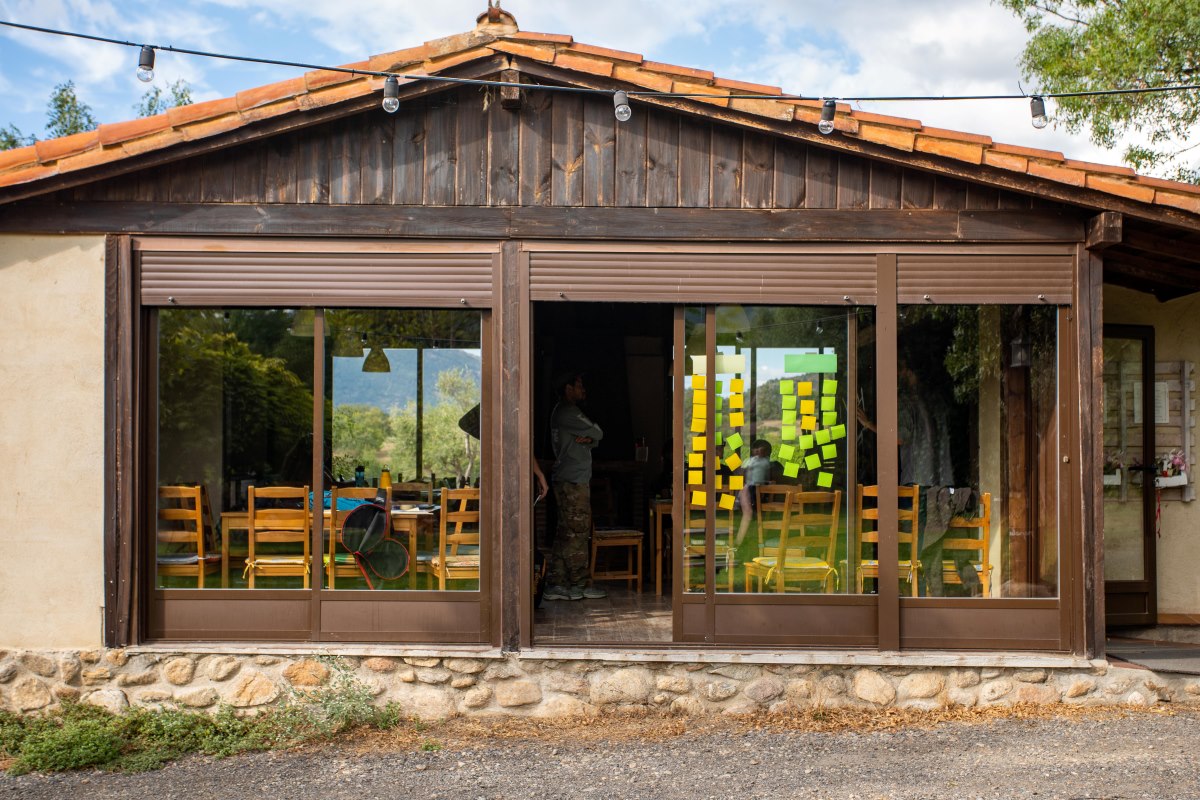
Collective Intelligence, Collective Joy
All too often, projects that espouse co-operative values can become too wrapped up in the functional aspects of democratic governance that they can neglect the social needs of those involved in the organization. Co-operation requires strong relationships to function, which in turn requires excellent communication, social awareness, and reciprocal emotional labor to be maintained.
Also, if it isn’t fun or even remotely enjoyable to work with each other, that can make participatory work extremely challenging! It’s critical that people take the time and effort to connect and share experiences outside of the purely practical work of stewarding an organization together.
“The sharing of joy, whether physical, emotional, psychic, or intellectual, forms a bridge between the sharers which can be the basis for understanding much of what is not shared between them, and lessens the threat of their difference.”
— Audre Lorde, Uses of the Erotic: the Erotic as Power
The Remastered Retreat allowed all of us to connect on a deep, interpersonal level, in such a way that also allowed each of our unique experiences and intelligences to be seen and recognized. It happened from the very first day, when we each shared a video with the group that formed our respective imaginations and ways of understanding the world. Our group commitments also helped to set the tone for us to relate in thoughtful ways.
DisCO Group Commitments
- To trust collective intelligence and knowledge exchange between peers.
- To give value to every type of knowledge, avoiding the distinction between experts and non-experts.
- To actively listen to others’ ideas, accepting diversity as the intellectual basis we all might embrace.
- To respect the rhythms and needs of others, taking into account that English is not the native language for most of us.
- To be as inclusive as possible addressing others, also taking into account our limitations as a group.
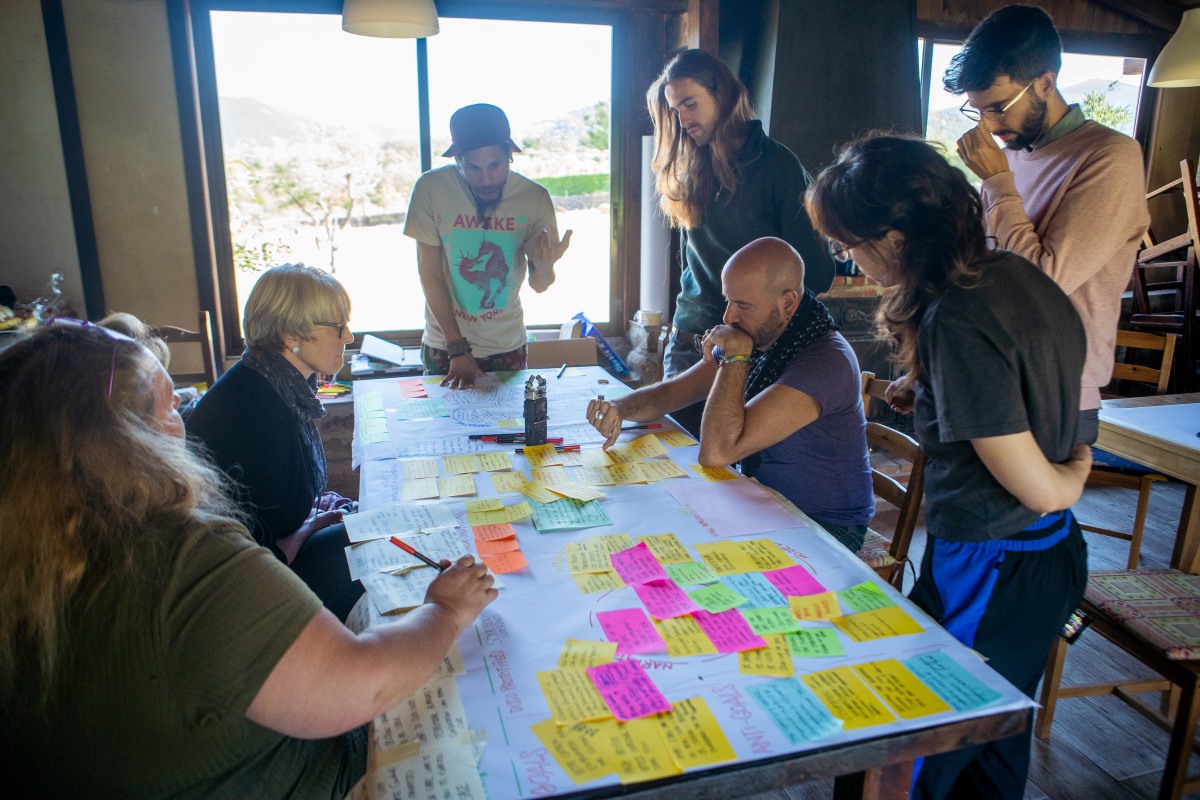
The Experience
We spent our days imagining the reality we wanted and formulating a plan to manifest it, while holding the weight of current realities. In between intensive work sessions, we shared our meals. We shared stories of our pasts. We came to know each other’s likes and dislikes and grew comfortable enough to tease each other for our foibles. Despite the fact that most of us hadn’t met before, by the end of the week we felt like old friends.
The following are memories and reflections by the participants who attended the DisCO Remastered retreat.
From brandon king of Resonate.Coop:
It was about bringing people together, who at surface value may have seemed disparate in terms of our connection. But when it came down to it, the ways we were thinking about the world and thinking about work, thinking about labor, thinking about ecology and sustainability, there was mad alignment there.
For me something that stuck out was the way in which we worked. To me, under capitalism, time is shrinking. You suck out every aspect of energy, strength, and thought power. It’s draining. I felt like the way we worked was very generative. We gave ourselves time and space for rest. We also gave ourselves time and space to connect and build. […] It spoke to me in that it felt like the journey is just as important as the destination. The way in which we work together and take care of each other and take care of ourselves, and that being not overlooked, not invisibilized, and something that is valued, recognized and acknowledged. For me that was the biggest thing.
I would describe DisCO as a framework, maybe even described as a methodology for looking at how we work with each other. One that takes into account enclosure of the commons, taking into account capitalism, taking into account all the different forms of oppression. Figuring out all the ways we can use distributed technology and our capacity to work with each other in ways that are more life affirming and ways that are more sustainable. Not only for ourselves but also for the planet […]. How we can [have] democratic control over these different aspects of our lives, instead of just relying on the major servers and technologies that extract and take from us. The technology that puts tech before people, or profit before people. Trying to put things back into a sense of alignment.
Another big thing about DisCO is the recognition of care work, something that capitalism needs in order to function, a labor that is hyper feminized. DisCO puts this into context, puts it into perspective into thinking about doing work and what should be valued. DisCO measures that value and makes sure that’s compensated. For me, that acknowledgement helps us shift our ways of being. Our ways of relating.
We’re trying to figure out a way out. […] To operate in a way that takes into account the harms, and takes into account our capacity to take care of ourselves and each other, and steward the land and this planet in ways that help us bring us to a better ecological balance. DisCO is about that vibe, that energy.
One of the biggest things is the dream work. Thinking whole systems and creating entire infrastructures for artists, for musicians, for everyday people to use tech. I think that’s big. To not just want to tackle one aspect, but to see whole systems and see what’s possible, from a standpoint of what we have access to. What modes of exchange already exist. For me that’s powerful, because the work is to amplify and formalize a lot of the informal communal or mutual ways of exchange that people have done to survive. That’s the beauty of DisCO. To dream the world we want to see. And while we’re doing it, being in a process of actualizing those ways of relations.
It’s important to make time and space to dream, for that time and space to feel generative. Because it actually gives energy – when it’s difficult, when you’re feeling drained, when your morale is low. For me, I have flashbacks to hearing the lambs and sheep. The flies, the sun, the pool, the fresh air. The view and the sunset. All of the beauty of the place and the beauty of nature. It puts a battery in my back. Not only in terms of when we were there, dreaming and manifesting these prototypes, but I feel like it’s a timestamp that I can go back to and go, “Yeah it’s possible. It’s in motion.” We turned on the ignition and the machine, in terms of the process of us dreaming together. Building community and connection with each other.
I look forward to continuing to build, to continuing to grow, to challenge each other. I want this to be something super tangible, for people, for my community. I think the challenge is putting it into [reality], not just concepts on paper. I feel like that’s a similar kind of issue that Resonate is dealing with. We have a brilliant, beautiful manifesto. But how do we actually actualize that? I’m excited to be a process with folks that want to actualize a framework for working together. Based on real time and space, with folks who really are concerned about shifting the conditions of this planet, and transforming them. Democratizing and expanding the commons. It’s super exciting. It’s a global connection. And so it doesn’t feel small. It can be hyper-localized but connected to other hyper-localized spaces that are on the same vibe. Maybe that’s what distributed means. Our diversity is our strength. I’m excited for us to lean into that, and make space for that.
From Luis H. Porras of amoved:
DisCO Remastered has been a great experience, I’ve found myself surrounded by inspiring people working on great projects, but most importantly, with a warm heart and willing to share. There are a bunch of beautiful memories I carry with me but there are two special ones I really enjoyed.
The first one is a night walk through Hervás in which we let ourselves fall downhill until we suddenly reached the river somehow, hidden in the shadows. We scattered as if nature was calling us, some started jumping from stone to stone, others taking pictures or touching the cold water. The night was calm and we decided to go all the way in the darkness to find a comfortable spot in which we could stare up at the stars. There we were, in a lost village in the Spanish countryside, in a meeting meant for dreaming, looking at the stars as if they were there to unveil some hidden hints to our desires of a joyful (or at least existing) future.
The second memory I keep in my heart is very special to me. Although it might just be an anecdote, those are the ones I cherish the most. Several of us stayed up late at night getting to know each other, so we arrived late for breakfast. Far from getting angry with us, Ann Marie and Stacco were joyful, asking if we had fun and if we had rested enough to get to work.
But that was not the detail that touched my heart. It was when we were leaving to go to our cabin to get ready that I caught by accident the conversation that Ann Marie and Stacco were having: “Ohh, it’s great that folks spent that time, it’s so important to get to know each other and share memories”
That was more or less what Ann Marie had said. A feeling of being home crossed through my body, one that is caring. I thought to myself, that’s what I’m seeking: to be surrounded by people that understand the importance of human relations, and how that enables group cooperation, shared values and visions and healing of our wounds.
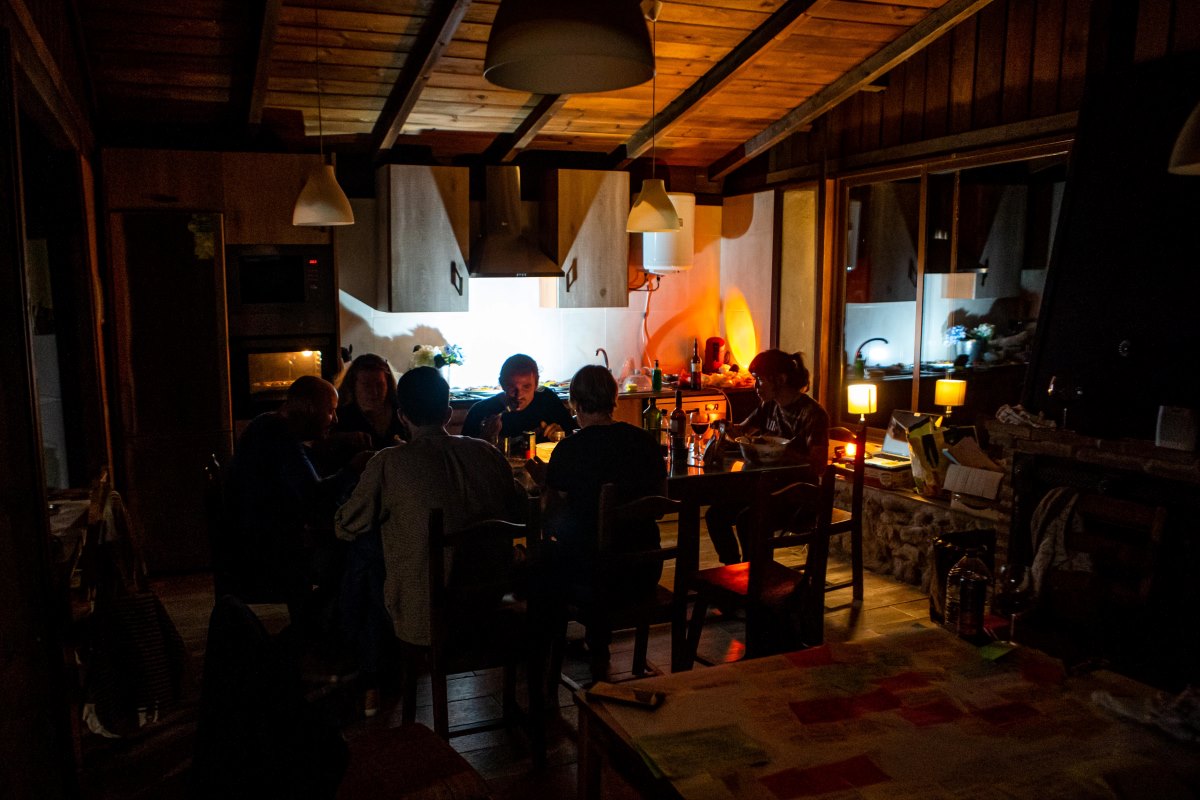
From Lucas Tello of ZEMOS98:
[A] beautiful thing that happened was that the borders between times of productivity and times of reproductivity and leisure were blurred until they were almost indistinguishable. For example, I found it impressive how the DisCO prototypes intersect with our personal interests and desires.
Having such a small group allowed us to actually get to know each other, which is rare on these occasions, and I could appreciate the distinctive ways each had to care for others. I tend to think of cooperation as a dynamic full of rules and mechanisms in activist circles, but it felt more like a sudden spark during those days, something that is lighted by an emotion rather than an explicit agreement. It was good to reclaim that joy of working with others, not just because you share a project, a political idea, or a common goal, but also because you just feel it works from a much more basic level.
I learnt very much about these connections between our struggles for political transformation and our needs and desires. We tend to think that working for social change is giving up on things we need or desire, and these days proved it should be the other way around: We may give up on things, but it should be done joyfully, for greater rewards. I think this happened there because it is encoded in DisCO, in the principles, their way of working, and their way of relating to others.
Among other things, I realized how important narrative structures are for our struggles. How our wishes and desires should be encoded in the way we share what we do. I was really surprised about how DisCO is able to turn a passion (love for music) into an idea (a platform to end Spotify), and how it works very thoroughly to make it operational, and to make it possible.
From Julio Albarrán, visual chronicler and video editor:
I am still truly and irrevocably grateful for the time we spent together. Surprised and moved and somewhat in shock. Like we, during four short days, had lived in a kind of utopia of love and respect. A kinda paradise where the most crazy activist ideas for a better world are all possible at once.
The diversity of profiles, yet the similarities amongst each other, made it just perfect. One of the most memorable things for me about that week is how easily we got along, like we had known everyone else for so long. It felt great for me as well how we all opened up so honestly and (apparently) weightlessly. I’m all for intensity! But also, it didn’t feel intense to me at all.
I took away quite a bit of hope. A sense of power, individual and collective power. I wish for more meetings, for more stories, and for more time together. I also took away a part of you all. Not only part of your souls within my own for having shared stuff together. But also literally all of your images and sounds explaining yourselves to the world for all time to come.
From mai ishikawa sutton of DWeb / COMPOST / Distributed.Press:
The memories from our week together that stand out to me are the moments when I sensed deep, deep alignment. I felt it when the group cooked dinner together, when we visited the local wool co-operative in town. One of the times I felt it most was when we visited an ancient oak that grew outside town.
Under this immense tree, we shared stories of a difficult time in our lives and the ways that allowed us to grow and learn about ourselves. We all felt safe enough to open up and be vulnerable, and be incredibly present with each other. That moment felt like a culmination of those days we spent talking through our values, our dreams, our fears, and our aspirations. It was so much more than a week of strategizing and planning, it was a time of heartfelt connection.
We shared that particular moment in the presence of this hundreds-of-year-old tree. Large swaths of its bark had been stripped away to make cork. Its branches stretched out dozens of meters across as if in defiance of its wounds. The tree embodied resilience, and it was a reminder of what we were fighting for: not just other humans, but ALL the other life that we share this planet with.
It also reminded me that this work takes time and intention. That what got us into this mess in the first place was how hurried, careless, and selfish some humans have become. They forgot where we come from and how interconnected everything really is. I think to heal from the dominant rationale of capitalism, which individualizes and atomizes us from each other, is going to require us to be patient with each other as we press forward and build alternatives.
To me it felt like all the conversations we had were in service of rebuilding that kinship. The pace of that week reflected the care and awareness we hope to carry through our work. And in that afternoon of sharing the personal challenges we overcame, it felt like we were also sharing ourselves with that big beautiful tree. I imagined that if it could hear us, it would nod in approval and encouragement.
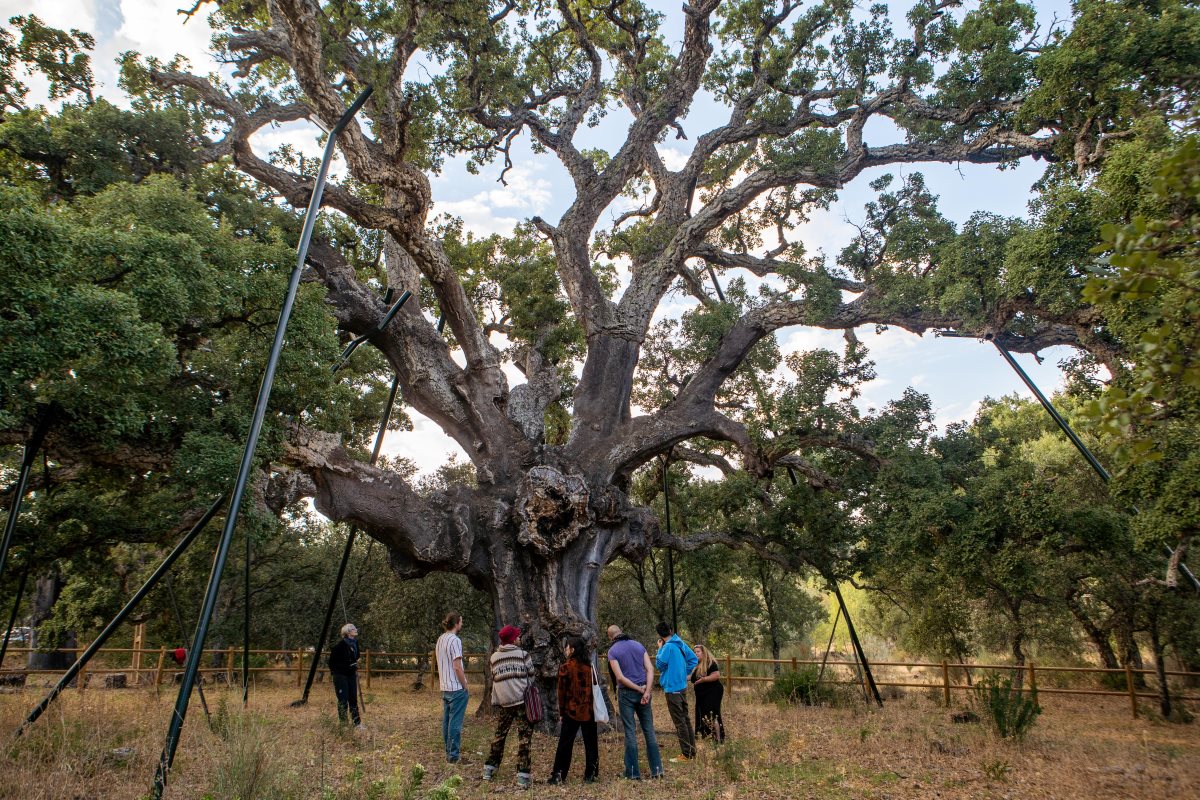
The DisCO Prototypes: Open Source, Open Hearted
Out of our shared passions and life work, we developed two SuperDisCO prototypes. In order to flesh out these two prototypes, we explored a series of questions that prompted us to imagine how they would be situated alongside existing digital technologies. We identified their goals and anti-goals, crafted their overarching narrative, and explored how they would map to the DisCO Principles.
Sonic Flow / SAGE
Sonic Flow is a full-stack economic system to give ownership and voice to all those who participate in the creation, production, and distribution of music, including artists, crews, and engineers. It would equitably support the labor of producing live shows and utilize bioregional materials for the production of physical media. Sonic Flow is also designed to function as an end2end distributed streaming platform and player, a record label, music marketplace and more. SAGE is a complementary DisCO dedicated to tending to the emotional needs of those during changemaking work, including art and music.
CSDC (Community Supported Digital Commons)
A network of free software projects that use and build upon existing network protocols, partnerships and ideas, based on solidarity economy principles. Inspired by the Community Supported Agriculture (CSA) model, the CSDC would build small communities that directly address the expressed digital needs of communities. They would be stewarded by several organizations together and prioritize community-centered design, maintenance and repair.
We also recognized that there were several values and approaches that overlap between these prototypes, including:
- Learning and sharing best practices for making these projects financially sustainable, while transitioning out of capitalist financial practices and exploitative labor models.
- Strengthening IRL (in person) connections and ensuring that technologies are based on local community needs.
- The acknowledgement of planetary boundaries and maintaining conscious awareness of ecological impacts of the software and hardware that is utilized.
- Building on existing open, interoperable, and legacy protocols and software that enables transparency, privacy and autonomy.
What Comes Next
We left that week with several ideas about how to continue our collaboration. For the upcoming DisCO Pink Paper, we came up with a list of topics and approaches we would want to explore in the document, including:
- Decolonial/liberatory technology
- Interorganizational infrastructure and communalizing
- Technological interoperability and the decentralization of power
- The value of rest, healing, and maintenance
We also wanted to ensure that the Paper would inform the DisCO Prototypes, and vice versa.
Overall, the pace and tone of the event allowed us to be both very productive during our work sessions, while also making the in-between times of meals, rest, and play all the more pleasant. Building out the Prototypes and writing the Pink Paper will both be big undertakings. But our week together at the DisCO Remastered event allowed us to lay a strong foundation for us to continue this work together in the years to come.
Additional Links
Participant Projects
- amoved – https://amoved.es/
- COMPOST – https://compost.digital/
- Cooperation Jackson – https://cooperationjackson.org/
- Distributed.Press – https://distributed.press/
- Decentralized Web – https://getdweb.net/
- DisCO.coop – https://www.disco.coop/
- Hypha Worker Co-operative – https://hypha.coop/
- Resonate.Coop – https://resonate.coop/
- ZEMOS98 – http://zemos98.org/

